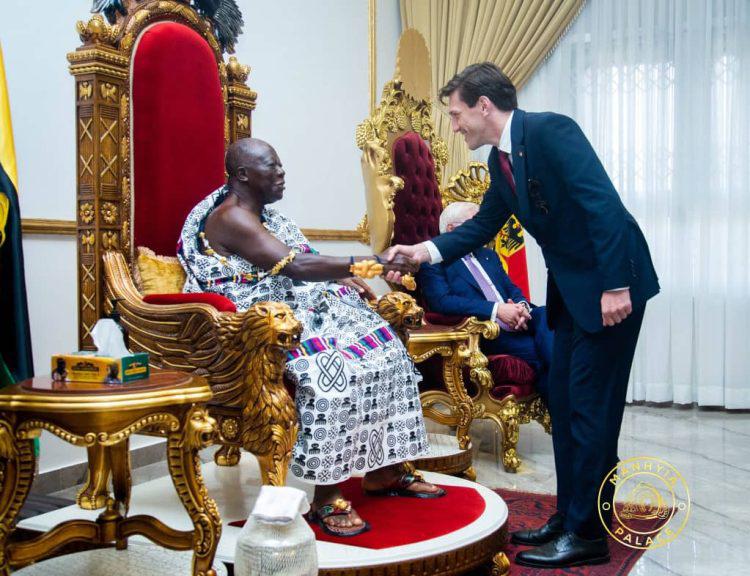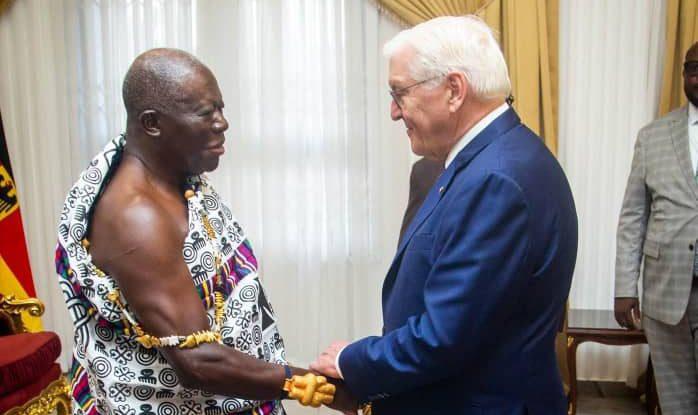Kumasi, Ghana — On Tuesday, November 4, 2025, German President Frank-Walter Steinmeier paid a courtesy call on the Asantehene, Otumfuo Osei Tutu II, at the historic Manhyia Palace in Kumasi. The visit formed part of President Steinmeier’s three-day state visit to Ghana (November 2–4), aimed at deepening bilateral relations and exploring new dimensions of cooperation between Ghana and Germany.

During the meeting at Manhyia Palace, the Asantehene and the German President discussed areas of collaboration such as vocational education and training. Earlier in the visit, Steinmeier met with Ghana’s President John Dramani Mahama in Accra, held bilateral talks on trade, investment, technology, and development cooperation, and visited technical and research institutions in Kumasi.
This encounter is significant for Ghana and the wider African context because it highlights Germany’s renewed commitment to partnerships in Africa beyond traditional diplomacy. For Ghana, it presents an opportunity to attract German investment and technical expertise in sectors like vocational training, innovation, and research. For Germany, it reflects a broader strategy to diversify partnerships on the continent amid shifting global trade and technological dynamics.
Ghana-Germany Relations: Asantehene
Germany and Ghana have long maintained friendly relations through cooperation in diplomacy, education, and development. The Asantehene has repeatedly emphasized that Ghana seeks genuine collaboration, not hand-outs, especially in technical education, agriculture, and environmental management. Strengthening middle-level technical and vocational education is now a national priority to tackle youth unemployment and boost industrial growth.

President Steinmeier’s trip follows earlier engagements with Ghana — his last official visit to the country was in December 2017. The renewed engagement underscores Germany’s sustained interest in West Africa’s stability and growth.
- Technical and vocational education: The Asantehene reiterated that Ghana prefers technical support and cooperation rather than financial aid.
- Innovation and start-ups: While in Accra, President Steinmeier met with civil society leaders and young entrepreneurs to discuss start-up development and digital innovation.
- Research and development: The visit included a tour of the Kumasi Centre for Collaborative Research and meetings with staff and alumni of the Kwame Nkrumah University of Science and Technology (KNUST).
- Trade and investment: Official discussions between Ghanaian and German delegations focused on deepening cooperation in trade, technology, and sustainable development.

In the Ashanti Region, the town of Suame—renowned for its vast artisan and mechanics cluster—was highlighted by the Asantehene as an area where German technical cooperation could have immediate impact. If such partnerships take shape, Ghana could benefit through technology transfer, skills development, and the strengthening of small and medium enterprises (SMEs).
Ghana’s broader effort to diversify its economy beyond raw materials makes partnerships with Germany even more strategic. Germany’s model of vocational education—the “dual system,” which integrates classroom learning with hands-on apprenticeship—could serve as an ideal framework for Ghana’s own technical training institutions.
- Skills and employment: Africa’s youth population is growing rapidly. Strengthening technical and vocational education, with support from international partners, is key to preparing young Africans for jobs in emerging industries.
- Diversified partnerships: As global economic alliances evolve, countries like Ghana are working to build balanced, mutually beneficial partnerships that go beyond traditional donor-recipient relationships.
- Regional influence: Ghana’s stability and democratic governance make it a preferred partner for European nations seeking meaningful engagement in West Africa.
- Beyond aid: The focus on cooperation rather than aid aligns with Africa’s push for sustainable, equal partnerships that promote local capacity and self-reliance.

The meeting between President Steinmeier and the Asantehene at Manhyia Palace symbolizes more than ceremonial diplomacy—it represents a vision for stronger, mutually beneficial cooperation between Ghana and Germany. The success of this renewed partnership will depend on how swiftly both sides translate discussions into tangible initiatives in training, innovation, and enterprise support.
For Ghana and other African countries, such collaborations could transform human potential into real economic progress, ensuring that development is driven by skills, innovation, and shared value.
Read also: Mahama Calls on Global North to Honour Climate‑Finance Pledges as Ghana Readies for COP30

